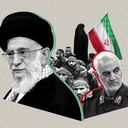Iran's network of proxies wields influence throughout the Middle East

Published Date: 1/18/2020
Source: axios.com
Iran has built up a vast network of proxies through which it wields influence across the Middle East, and which could take action to stoke tensions between the U.S. and Iran over the killing of Gen. Qasem Soleimani.Why it matters: The political parties and militias that are influenced by and act on behalf of Iran likely pose a more direct threat to U.S. targets than Iran itself, the Washington Post writes.Iran could direct the proxy groups to strike American military assets in areas where Iran has strong influence, such as with Hezbollah in Lebanon, The New York Times notes.Worth noting: Soleimani, who was killed in a U.S. drone strike, was the mastermind behind Iran's proxy network, according to the Middle East Institute.Iranian proxies in the Middle East: Iraqi militias: How it started: Iran has since the 1980s supported Shiite militias that opposed Saddam Hussein's Sunni government, the Post notes.Iran's influence and political power grew following the American invasion of Iraq in 2003 and continued to grow as the same militias took on ISIS, AP reports.Who's in charge: The Popular Mobilization Forces is an umbrella group for numerous Iranian-backed militias, and was run by Abu Mahdi al-Muhandis, who was killed alongside Soleimani in the U.S. drone strike, AP notes.Iraqi protesters have recently demonstrated against Iranian influence in the country.Hezbollah in Lebanon: How it started: Hezbollah is Iran's earliest and most successful proxy, per the Post. The Shiite paramilitary group formed in the early 1980s during the Lebanese civil war and later found success as a political party. The U.S. has said Hezbollah receives financial support from Iran, but the group consistently denies the claim.Who's in charge: Hassan Nasrallah is Hezbollah's current secretary-general.Hezbollah pledged loyalty to Ayatollah Khomeini, who took power in Iran following the 1979 revolution, according to the Council on Foreign Relations.Nasrallah promised Hezbollah would begin targeting U.S. forces following the killing of Soleimani, Al Jazeera reports.Houthis in Yemen: How it started: The Houthi Shiite rebel group rose to international prominence in 2015, during the Yemeni civil war, nearly 25 years after its founding, according to the Guardian.Who is in charge: Hussein Badreddin al-Houthi founded the group, but was killed in a 2004 rebellion against Saudi Arabia. His brother, Abdul-Malik al-Houthi, is the current leader. Iran began to support the Houthis more actively after the start to the Yemeni civil war, the Post writes. The Houthis are financially and militarily independent of Iran, per the Post. Flashback: Houthi rebels claimed responsibility for rockets that hit a Saudi oil facility in September 2019, but the U.S. government blamed Iran for the strike. Iran's power in Syria: Iran has mobilized some of its proxy groups, most notably Hezbollah, to fight in Syria's civil war on behalf of President Bashar al-Assad — one of Iran's few Arab allies.Iran has sent Iraqi militias and Shiites from Afghanistan and Pakistan to fight in the Syrian civil war, Bloomberg reports.The U.S. on Iran's proxies: Secretary of State Mike Pompeo warned Iran in mid-December that using its proxies to harm Americans would result in a “decisive U.S. response," Military Times reports.Pompeo has also claimed Iran is working with militants in Afghanistan, including the Taliban.Go deeper: Trump responds to missile strikes: "Iran appears to be standing down"Where U.S. troops and military assets are deployed in the Middle EastThe Trump administration's mixed messages on the Soleimani strike